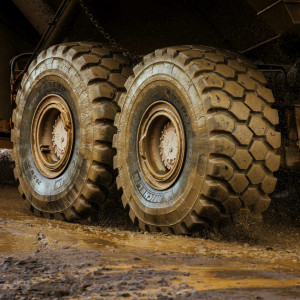Michelin’s Approach to Off-Road Tyre Performance


Michelin's approach to off-road tyre performance. In the demanding worlds of mining, construction and demolition, tyre choice can be the difference between smooth operations and costly downtime. With machines working across unforgiving terrain, operators need rubber that withstands punishing conditions while delivering long-term value.
According to Clifford de Jager, CES Technical Manager, Beyond Road - Mining, Construction, Material Handling, at Michelin, that level of performance starts long before a tyre hits the ground. "Each Michelin tyre is designed specifically for the job that it will be used for," explains de Jager. "For instance, while an agricultural tractor tyre includes technologies to be kind to the soil, a tyre working in a quarry or a mine doesn't require those attributes. It will be designed more for durability, longevity and robustness."
Michelin's Beyond Road and construction ranges cover everything from small dumpers to giant mining vehicles operating deep underground. But despite the variety, de Jager says there are consistent principles when selecting an off-road tyre. "First and foremost, the conditions of use are absolutely crucial.
This will always have a big impact on performance, so ensuring you choose correctly from the outset will help avert any issues further down the line." Damage resistance, longevity and reparability sit high on the priority list, too. With machines frequently operating on rocks, uneven surfaces and debris-laden terrain, tyres need to combine strength with predictable wear.
"We always advise selecting a tyre with strong resistance to damage. Superior durability reduces downtime and keeps tyres on the machines for longer, ultimately saving money," he adds. "And it's important to pick a tyre that can be repaired easily. Even with the most durable tyres, damage will occur.
Being able to repair and return a tyre to service quickly reduces waste and protects the environment." Inspection and Monitoring: The First Line of Defence Regular tyre inspection remains essential, particularly in hazardous off-road settings.
Pressure checks, visual inspections and damage assessments all help prevent failures before they occur. But technology is taking tyre management further. "Tyre Pressure Monitoring Systems (TPMS) are increasingly important in the construction and off-road sectors," de Jager says. "Various models of TPMS are available on the market to monitor tyre pressures and alert the operator, maintenance team or service provider of any abnormalities like a variance in tyre pressure or heat.
Timely actions can be implemented to ensure that the tyre is not damaged due to an incorrect tyre pressure or heat build-up, while also helping the tyres to operate at optimal performance levels." Repairing and Retreading: Extending Tyre Life Given the high cost of OTR tyres, repairing damaged casings makes strong economic and environmental sense.
Michelin designs tyres with repairability in mind, and de Jager stresses that both preventative and structural repairs are possible when done professionally. "Michelin tyres can, under certain conditions, be repaired: this possibility is built in at the design stage. Repairing a tyre extends its life, helping operators make cost savings while protecting the environment by delaying scrapping," he says.
Beyond repair, Michelin also views retreading as a core pillar of sustainable tyre use.
"Most of our mining and quarrying tyres, and many construction tyres, are designed to be retreaded," de Jager confirms. "Retreading uses fewer raw materials and is usually more cost-effective."
As fleets continue seeking efficiency gains and lower carbon footprints, Michelin's commitment to durability and lifecycle optimisation positions off-road tyres not just as consumables, but as critical assets engineered for long-term performance.
Transport & Logistics - Driving The Industry Forward